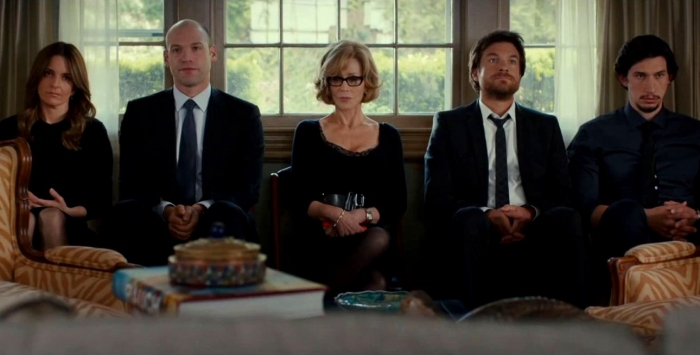You are here
Home › Movies › "This Is Where I Leave You" Showcases Bateman and Fey but Lacks Substance ›"This Is Where I Leave You" Showcases Bateman and Fey but Lacks Substance
FTC Statement: Reviewers are frequently provided by the publisher/production company with a copy of the material being reviewed.The opinions published are solely those of the respective reviewers and may not reflect the opinions of CriticalBlast.com or its management.
As an Amazon Associate, we earn from qualifying purchases. (This is a legal requirement, as apparently some sites advertise for Amazon for free. Yes, that's sarcasm.)

Life can be funny sometimes. You could be perfectly content, making good money at a job you actually enjoy, with a loving wife and a beautiful home, and then suddenly life throws a monkey wrench into the machine. Everything goes crazy for a while and hopefully, eventually, you come to terms with the changes and find a place of contentment.
That’s the basic premise of “”This Is Where I Leave You,” a new semi-dramatic comedy starring Jason Bateman, Tina Fey and Jane Fonda. Bateman plays Judd Altman, the middle son of mother Hillary’s (Fonda) family, and whom the narrative generally revolves around. Bateman is very believable as late 30-to-40-something who has that monkey wrench tossed into the gears of his life. His wife Quinn (Abigail Spencer) has been sleeping with his boss Wade (Dax Shepard) for a year when Judd finally stumbles upon them in the act. While living apart pending the divorce, his father dies. The family gathers for the funeral where Hillary announces that they will all spend seven days in “shiva,” a week-long Jewish ritual of mourning, at their late father’s request even though the deceased’s own religious views were not clearly defined as being particularly orthodox. For the rest of the film Judd, big brother Paul (Corey Stoll, late of Netflix’s House of Cards), perpetual child and baby brother Phillip (Adam Driver) and sister Wendy (Tina Fey) are forced to make nice and reminisce, which, being a comedy, you can probably guess as to how well that works out.
I guess it’s all a matter of perspective. The audience laughed out loud pretty regularly throughout, so if this sort of dysfunctional family-oriented humor is your thing you’ll like just fine. It all felt a little obvious to me, except for things seemed glaringly overlooked. Why exactly was this family so dysfunctional? Paul was responsible, Judd seemed affable, Phillip might me a bit rambunctious but there’s one in every family. Wendy had issues with her husband, but what about her parents and siblings? There wasn’t much time or effort spent in explaining why these people struggled to share a house again for seven days of mourning. It seemed a surprising omission by director Shawn Levy, whose films have done over $2 billion gross over the last decade.
The jokes aren’t necessarily bad; they just felt like I’d heard them before in a dozen other similar films. That’s not to say I didn’t laugh at all, but for me the best moments were when the actors felt the most real. Tina Fey and Jason Bateman having a good and often hilarious brother and sister heart-to-heart on the roof, just as they had when they were kids, felt completely believable. Bateman and Fey had very good chemistry, and felt the most authentic out of the entire cast. To be honest, Bateman has strong chemistry with everyone in this. Put on the spot by his younger brother’s fiancée Tracy (Connie Britton) about his fidelity, Bateman’s response felt completely real and Britton’s reaction was spot on as well. As enjoyable as Bateman was I wish he’d have had a little more time to build up the budding romance between Judd and Penny (Rose Byrne), his old high school sweetheart. The same goes for Tina Fey’s Wendy, who is less than subtle about still having feelings for Horry (a very un-Justified role for Timothy Olyphant), her beau from younger days who suffered a brain injury while they were dating.
If it had just been a drama about a dysfunctional family coming together and rediscovering each other, I feel it would have been a more effective story. The pure comedy bits just felt like someone said, “This needs to be funnier, let’s do this gag here, and this one there.” Tina Fey is naturally funny. Bateman has a kind of warmth about him that makes him someone you root for. Jane Fonda plays her role for laughs, but ultimately reveals that she just wanted the family to be a family again. It’s a real shame that the predictable humor didn’t leave room to explain why the family was so fractured in the first place. With such a strong cast even a pure drama would have enough natural humor and heart to sustain it.
“This Is Where I Leave You” is a decent film, and enjoyable enough, I just wanted something more--or maybe less? I can tell you this with utmost certainty: I never thought I’d appreciate that snot-nosed brat from Silver Spoons as much as I do now. Though the film may not be crafted to my personal taste, Jason Bateman and Tina Fey are terrific, both separately and together. Maybe I enjoyed this film just a little more than I thought...life is funny like that, sometimes.


